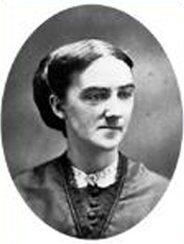
1842 – 1911
"One of the most disheartening things of the day is to see the waste of time and energy in the occupations of nine-tenths of American women." In the waning years of her life, Ellen Henrietta Swallow Richards would say that she had tried to show what an average American woman could accomplish. Be that as it may, her career was anything but average. Ellen Richards was the first woman to graduate from MIT, a pioneer in the fields of sanitary engineering and public health, and the founder of euthenics and home economics.
Born December 3, 1842 in Massachusetts, Ellen was the only child of Peter and Fanny Swallow. Both Peter and Fanny were teachers, and Ellen was educated at home and at Westford Academy. Ellen's father was her most ardent supporter in her quest for a college education, and at the advanced age of 26 she enrolled in Vassar College, graduating in two years with a B.S. in chemistry. Seven months after graduating she became the first woman to attend the Massachusetts Institute of Technology. In 1873 Ellen received a second B.S. in chemistry from MIT and an M.S. from Vassar.
According to her husband, she was discouraged from pursuing a Ph.D., however, because the MIT administration did not want the institution's first doctorate in chemistry to be awarded to a woman. Upon graduation Ellen became a research assistant to Professor William Nichols. Nichols was charged with assessing water quality within Massachusetts, and soon Ellen became an expert on water and sewage analysis. She tested Massachusetts' streams, water supplies, and sewage for the Board of Health. Her water analysis was the foundation for the National Chlorine Map, a standard for sanitary surveys.
In 1875 Ellen married Professor Robert Richards, head of the department of Mining Engineering at MIT. The marriage relieved Richards of the necessity to support herself financially, and afforded her the ability to explore a variety of interests. During this fruitful period after the marriage, she devised a method to determine the amount of nickel in various ores, and became authority in the chemical analysis of ores. Richards also discovered Samarskite (a rare ore) and was the first to isolate the element Vanadium. Her work led to her election in 1879 as the first woman member of the American Institute of Mining and Metallurgical Engineers. In 1876 Richards also successfully arranged for funding by the Women's Education Association of Boston for a Woman's Laboratory at MIT. Richards selflessly worked at the Laboratory for seven years without salary, and even gave about $1000 per year of her own money towards the upkeep of the facility. Her dedication to the students who passed through the Woman's Laboratory was finally rewarded in 1884 when she received a salaried faculty appointment at the new Laboratory of Sanitation Chemistry. During this period she also introduced biology into the MIT curriculum and helped to establish the Woods Hole Oceanographic Institute.
In the new laboratory Richards expanded her research to include the chemical analysis of staple foods. She translated her growing knowledge of nutrition into practical applications. In 1890, Richards opened the New England Kitchen in Boston, which informed people about nutrition and food preparation. A similar kitchen was created at the World's Fair in Chicago three years later. In 1899 Richards organized a conference in Lake Placid, New York that served as the basis for the American Home Economics Association.
Though Ellen Richards is known primarily as the founder of home economics, her contributions to sanitary engineering, including the training of a generation of sanitary chemists, should not be overlooked. Her important publications in the field include Sanitation in Daily Life (1907), Laboratory Notes on Industrial Water Analysis: A Survey Course for Engineers (1908), and Conservation by Sanitation (1911). Her vision of a single, unified science of Ecology was met with tepid support because of the prevailing attitudes of "men's " and "women's " spheres at the turn of the century. To honor her achievements as a sanitation engineer and a chemist, Smith College awarded Richards an honorary Ph.D. in 1910.

